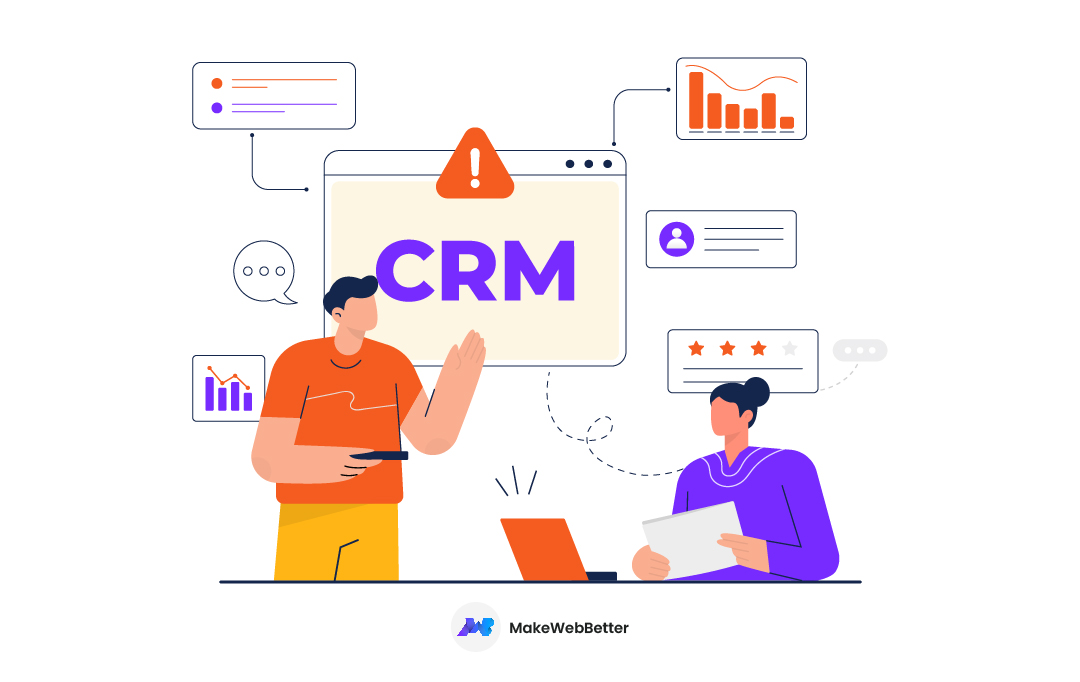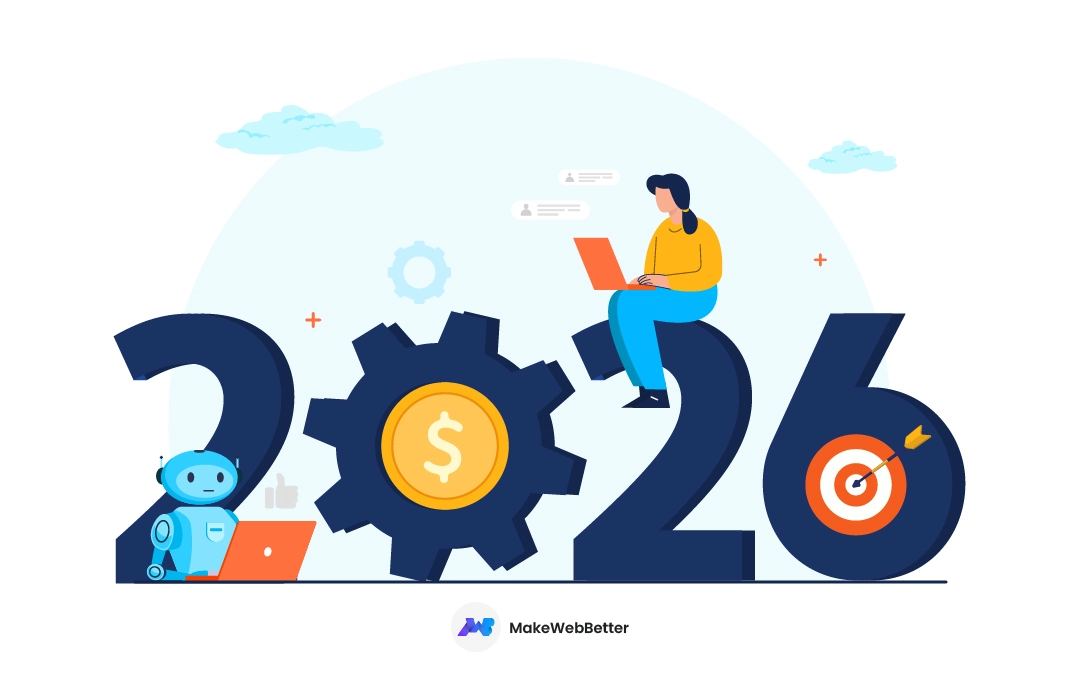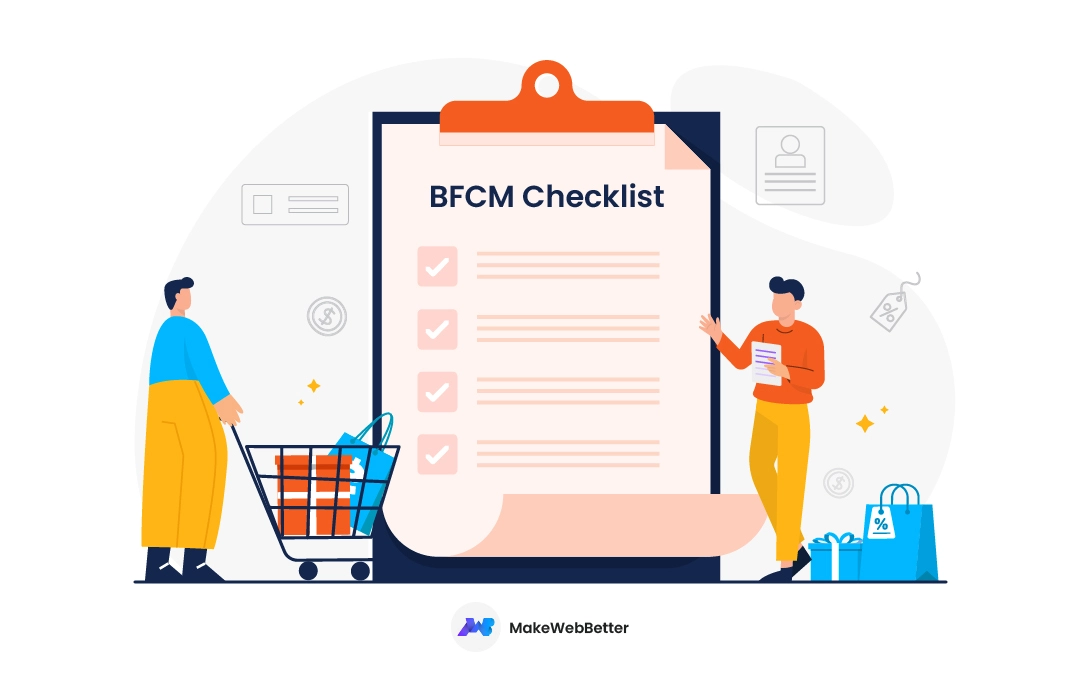A CRM can be a lifeline for your business.
It helps you manage and organize your data, track and report on it, deliver the right content at the right time and generate, nurture and convert your leads.
But to do this successfully, you have to adopt the tool successfully.
And many businesses often fail at this very point.
In this post, I will share some points that will help you deal with CRM implementation failures and fix them.
So let’s come straight to the point.
The Need for a perfect CRM Implementation
A perfect CRM implementation is crucial for businesses to achieve success. Here are three key points explaining the need for a perfect CRM implementation:
-
Enhanced Customer Relationships
A well-executed CRM implementation allows businesses to centralize customer data, interactions, and purchase history. This comprehensive view empowers teams to understand customer preferences, user behavior, and pain points, enabling personalized and targeted communication.
With better insights, companies can build stronger, long-lasting relationships with customers. Good relationships improve your customer experience.
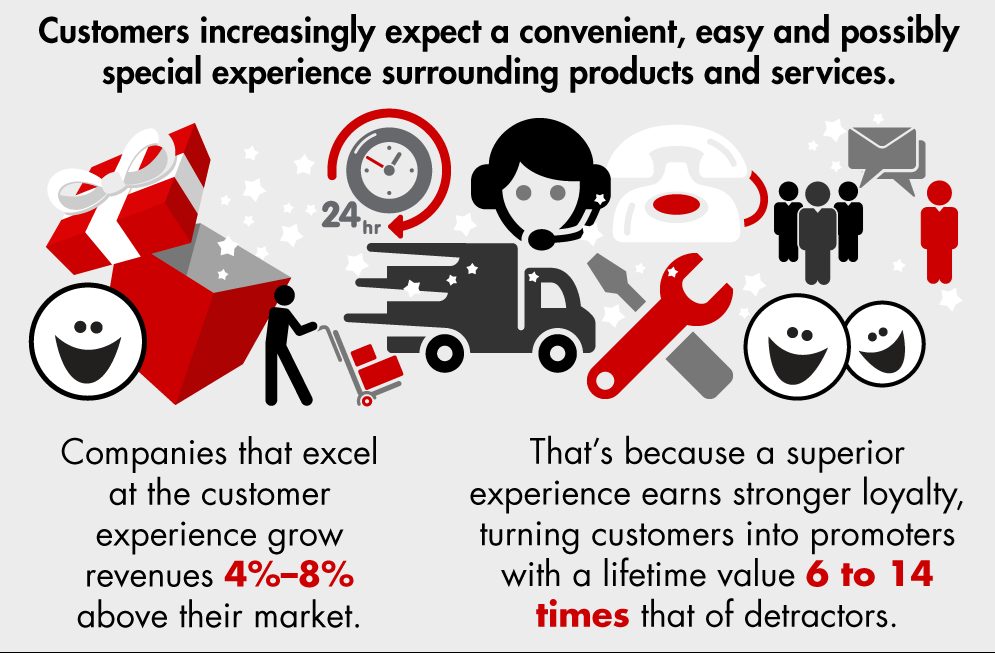
Source: Bain & Company
And a Bain & Company report shows that customers having great experience have a 600-1400% higher lifetime value than Detractors.
-
Streamlined Business Processes
CRM systems optimize business workflows by automating manual tasks, such as data entry, lead tracking, and customer follow-ups. By streamlining these processes, companies can improve operational efficiency, reduce errors, and save valuable time and resources.
The CRM’s reporting and analytics features provide real-time insights into sales performance, marketing campaigns, and customer behavior, enabling data-driven decision-making and continuous process improvement.
-
Competitive Advantage
Gaining a competitive advantage is one of the top 3 priorities for 57% of the companies. Source: Evalueserve
And in this highly competitive market, a perfect CRM implementation can become a significant differentiator. With a deeper understanding of customers and streamlined processes, businesses can deliver exceptional customer experiences and stay ahead of the competition.
A satisfied and loyal customer base can lead to increased market share, brand reputation, and sustainable growth, while also attracting new customers through positive reviews and recommendations.
9 Reasons Behind CRM Implementation Failure
But why CRM implementations fail? What are reasons that disrupt the way you incorporate a CRM? Let’s discuss some of the key reasons that cause CRM implementation failure in your business.
1. Selecting the Wrong CRM
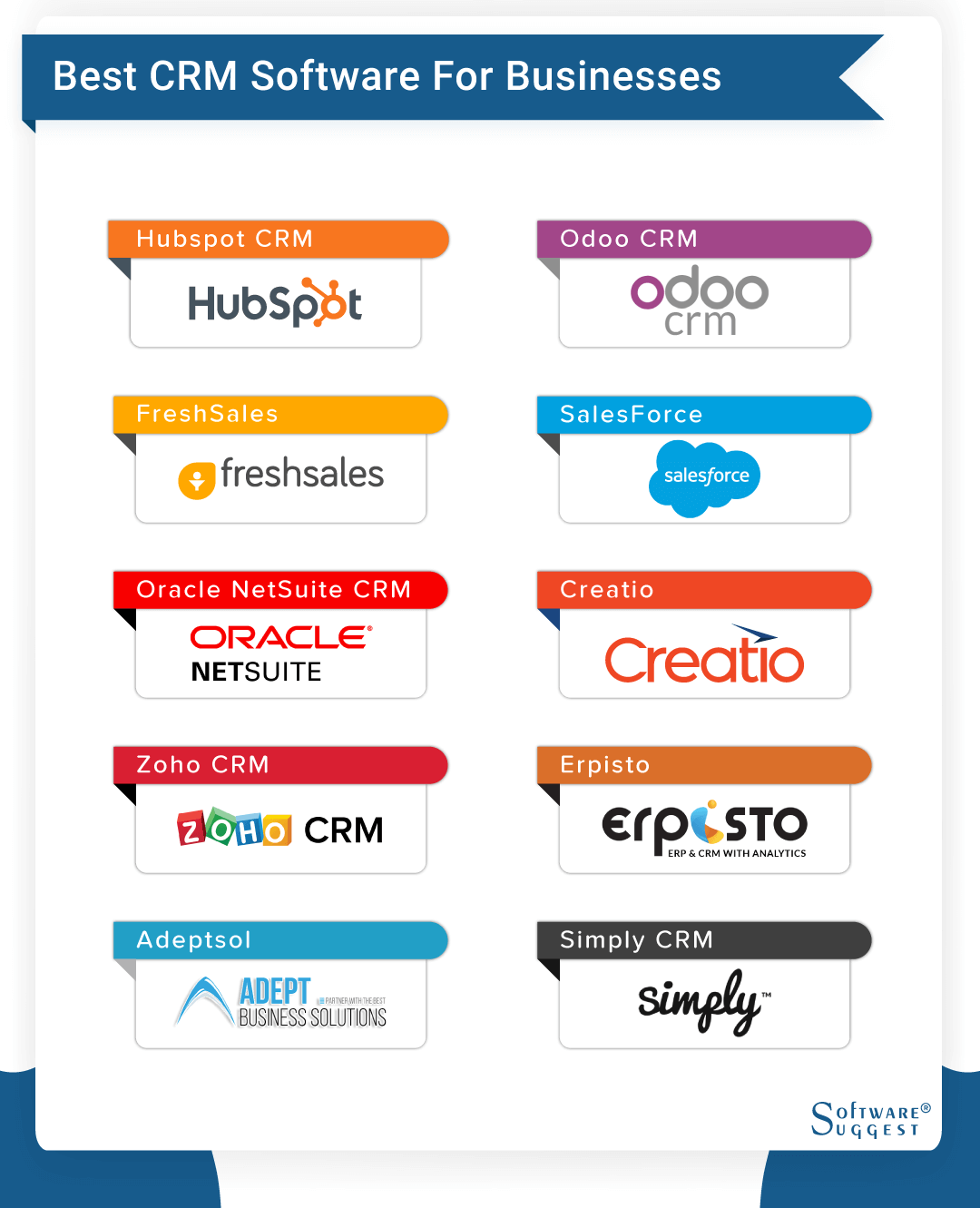
Credit: SoftwareSuggest
Unpopular opinion: Many businesses are using the wrong CRM.
The first step in your CRM implementation journey is selecting the right CRM.
And many businesses start off this journey with the wrong step.
When selecting a CRM, most businesses often go with the most popular one. The one that makes the most noise. Or the one that is marketed heavily.
But that could be a reason behind your CRM implementation failure.
Every CRM is designed differently and can be helpful for different business requirements. Thus, you need to understand what your requirements are.
You should not go with a CRM that is recommended by the biggest brands in your domain.
Instead, look for the CRM and pick one that is crafted for your business needs.
You can, for example, choose HubSpot CRM if you’re a small business just starting off with a small team.

Optimize your CRM with FREE HubSpot CRM Checklist!
Make the most out of your HubSpot CRM by auditing it and fixing the loopholes with .
2. Not Involving Your Team Since the Beginning
Another reason behind CRM failure is the lack of involvement of your team since the beginning of CRM adoption.
If you are planning to adopt a CRM in your organization, talk to your team prior to it. Having a conversation with them will help you identify the troubles they face. So you’ll have your needs clear which will help you pick the right CRM software.
Your team will be the end user of your CRM, so not involving them in the decision-making would be a mistake.
Hence, try to get your team in the loop from the beginning. Ask them about their needs, issues, and feedback to have a better idea of which CRM to go with.
3. Not Training Your Team to Use the CRM
Lack of training = lack of expertise.
And that could be the biggest reason for CRM implementation failure.
If you don’t train your team enough to use the CRM, they may not get familiar with the tool enough. And if they don’t use the tool to its fullest, you won’t extract the value from the tool you look for.
So, once you employ your CRM, you need to make sure your team knows the CRM inside out. Though using every feature to its fullest might not be possible, they must have an idea.
You can hold some training sessions and workshops, share some tutorials to give your team a good idea about CRM.
You just need to get things started. Once you adopt the CRM software and start using it in your everyday work, you’ll get on the nitty gritty.
4. Not Using the Trial Period to the Fullest
A CRM’s trial period is like a car’s test drive.
You have to check all the features, rev up your CRM, and use it to its full potential to check if it’s right for your business.
But most businesses don’t do it successfully. People often use CRM superficially in its trial period, which acts as a big reason for CRM failure.
It is crucial to use every feature of your CRM in the trial period. You have to judge every aspect of the CRM. Like its UX/UI, features, automation capabilities, customer support, etc.
And you don’t need to purchase the CRM if it doesn’t meet your expectations in the trial period.
There are dozens of other options in the market. Do not think twice to go after them if you don’t like the one you just tried.
5. Under or Over-utilizing the Tool
Once you adopt the CRM in your organization, you’ve to use it in your everyday tasks.
But this does not mean you should start using every feature of it or a very few.
Most businesses try to squeeze the maximum value out of CRM software just because they’re paying for it.
But honestly speaking, CRM software contains several features that are not at all useful for your business.
And if you try to use them just because they’re there for you, you’ll overcomplicate your work and process.
Similarly, you don’t need to stick to a few useful features only just because you’re afraid of messing up things. Who knows how helpful a trivial feature you never used can be for you?
The point is, before trying a new feature, research it and try to see how it works. Also, contemplate on if this feature will streamline your work or not. It will give you a better idea if you should incorporate it into your work process.
For a clearer understanding, you can ask your team to try the feature(s) for a specific time period and look if it is solving any of their problems.
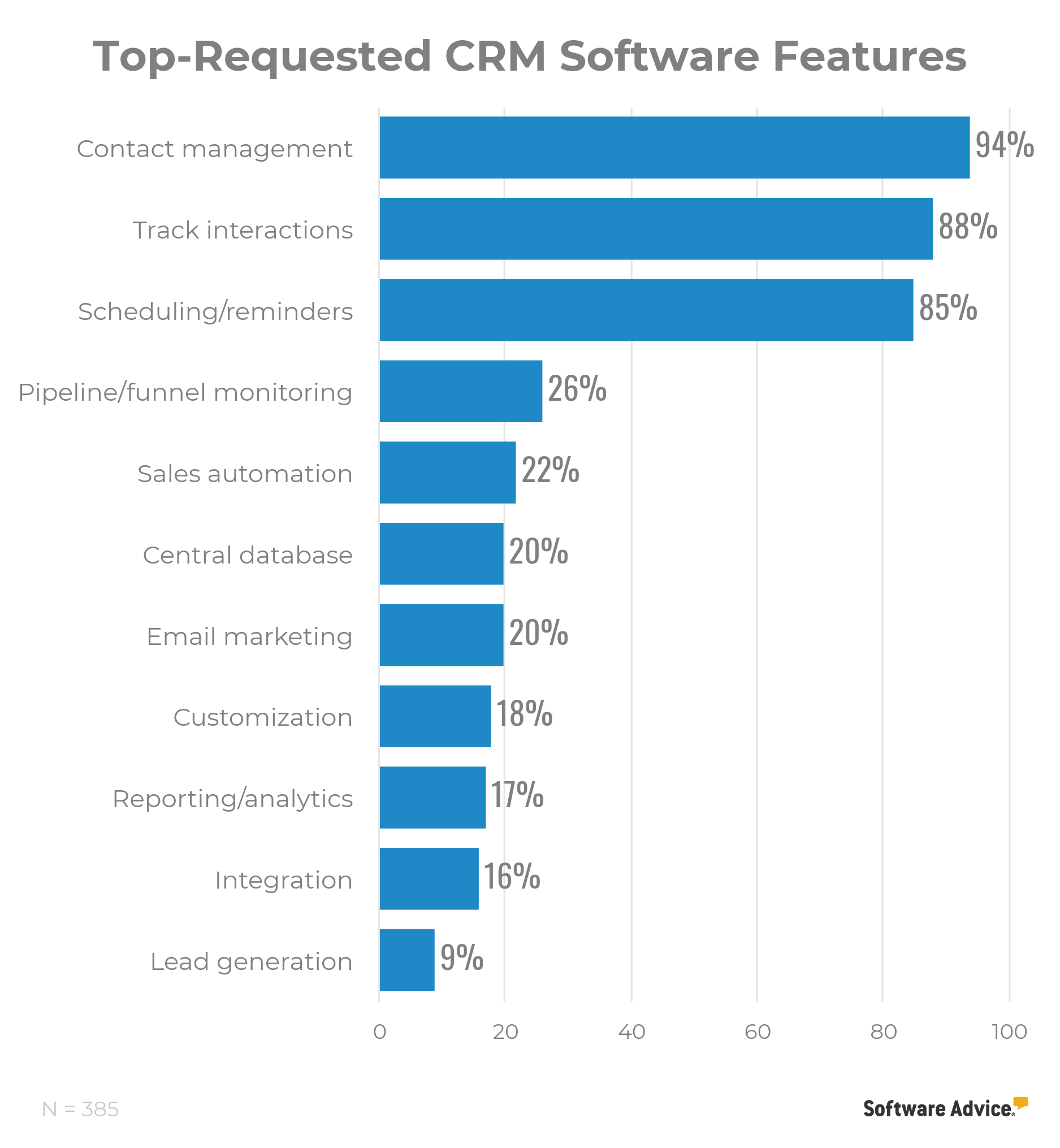
According to the research from Softwareadvice, here’s the list of features users look for in a CRM while adopting it.
6. Not Specifying Your Goals Clearly
According to Findstack, 92% of the brands think that CRM is crucial to achieving goals.
With unclear goals, you’ll be circling around a loop reaching nowhere.
Goals act like fuel. It helps you work towards something you want to achieve.
Similarly, if you’re not sure about your CRM goals, it causes a CRM implementation failure.
This becomes a problem for several businesses. As they scale, they think they need a CRM solution to streamline their work. But they are not sure about the goals they want to achieve with the CRM.
So, before you purchase a CRM, brainstorm the goals you want to achieve with it. Once you have your list of goals, look if they really deserve CRM aid or can be fixed with some trivial tweaks.
For example, according to a report from Grandviewresearch, 82% of the brands use CRM for sales reporting.
You also need to keep in mind that if your team also has a clear idea about their goals. Otherwise, they’ll not be able to focus properly on their jobs.
So ensure that you share your company’s goals with your team. This will help you avoid CRM failure.
7. Adding Bad Data into Your CRM
Bad data is the biggest enemy of your CRM.
And a vital reason for CRM implementation failure can be the bad data living in it.
Bad data occupies your CRM’s space, makes it cluttered, and slows it down. On top of that, if you’re having bad data, you’ll start catering to it. And catering to bad data is the last thing you’d want.
For example, let’s say your CRM has an email list where inactive users are also added. So, while sending emails, you’ll also deliver emails to those inactive users, which is pointless since they’ll not interact with it. This will decrease your email open rates and give you inaccurate insights.
Want to declutter your HubSpot CRM?
Connect with our experts and they’ll help you cleanse your HubSpot CRM data.
8. Poor User Adoption and Training
Poor user adoption is one of the most common reasons for CRM implementation failure. If users are not willing to use the CRM system, it will not be successful.
There are many reasons why users may not adopt a CRM system, including may not:
- see the value in using the system.
- be comfortable with the new CRM software.
- have the time to learn how to use the system.
- be supported by their managers or colleagues in using the system.
Poor training is another major factor that can contribute to poor user adoption. If users are not properly trained on how to use the CRM system, they will not be able to use it effectively. This can lead to frustration, errors, and ultimately, a lack of adoption.
Here are some tips to avoid poor user adoption and training:
- Get buy-in from stakeholders: Make sure everyone is on board with the project and that there is support for its success.
- Make sure the system is easy to use: The CRM system should be easy to use and navigate.
- Provide comprehensive training: Users should be provided with comprehensive training on how to use the CRM system.
- Provide ongoing support: Users should be provided with ongoing support to help them with any problems they encounter while using the CRM system.
By following these tips, you can help to ensure that your CRM implementation is successful and that users are able to adopt and use the system effectively.
9. Data Quality and Integration Issues
Data quality and integration issues are another common reason for CRM failure. If the data in your CRM system is not accurate, complete, and consistent, it will be difficult to use the system effectively. This can lead to errors, missed opportunities, and ultimately, a lack of success.
There are a number of factors that can contribute to data quality and integration issues, including:
- Poor data entry: If users do not enter data correctly, it can lead to errors and inconsistencies.
- Duplicate data: If there is duplicate data in your CRM system, it can be difficult to track customers and prospects.
- Incomplete data: If important data is missing from your CRM software, it can be difficult to make informed decisions.
- Inconsistent data: If data is not entered in a consistent way, it can be difficult to use the system effectively.
To avoid data quality and integration issues, it is important to:
- Clean up your data: This involves identifying and correcting errors, duplicates, and missing data to cleanse your CRM data.
- Implement data validation rules: This will help to ensure that data is entered correctly.
- Use a data integration tool: This can help to ensure that data is transferred between different systems accurately.
- Train users on data entry: This will help to ensure that users enter data correctly.
By following these tips, you can help to ensure that your CRM system has accurate, complete, and consistent data. This will make it easier to use the system effectively and achieve your business goals.
Impact of CRM Implementation Failure
But what happens when a CRM implementation fails? What impact it leaves on your business?
Let’s have a close look at it.
Financial implications
CRM implementation failure can lead to significant financial losses for a company. Investments in the CRM system and related costs become futile, resulting in wasted resources.
Missed opportunities and potential revenue loss from inefficient processes can further impact the bottom line, making it challenging to recover the initial investment and impeding future growth.
Negative effects on customer relationships
A failed CRM implementation can erode customer satisfaction and trust. Inaccurate or incomplete data, unaddressed customer issues, and delayed responses can lead to frustrated customers.
Poor customer experiences may result in higher churn rates, damage to brand reputation, and reduced customer loyalty, ultimately harming the company’s market position.
Employee morale and productivity
Unsuccessful CRM implementation can cause employee frustration and demotivation. When employees encounter difficulty using the system or see little benefit from it, productivity declines.
The resistance to change and lack of proper training may lead to inefficiencies, hampering teamwork, and collaboration, ultimately affecting the overall performance of the organization.
Tips to Avoid CRM Implementation Failure?
We now know the reasons behind CRM failure. But how to prevent it? How can you employ a CRM successfully in your organization? The answer is simple.
By following the following tips.
-
Select the Right CRM, Instead of What’s Popular
While researching for the CRM, do not go with the most popular one blindly.
There are many CRMs in the market that are popular and widely used. But they may not be apt for your business requirements.
Hence, brainstorm on your requirements first and list them out. And then select your CRM based on those requirements.
For example, if you’re looking to strengthen your customer support, go with a service-oriented CRM like HubSpot Service Hub.
-
Keep Your Team in the Loop
Your team will also use the CRM. So keep them in the loop from the beginning.
Ask them about the challenges they deal with and the features they’re expecting in their CRM.
Go for a CRM that is made for your team and it will help you avoid CRM failure.
-
Make Your Team Learn the CRM
Once you adopt a CRM solution, do not forget to train your team.
Yes, your team will learn the CRM on their own with time. But you have to help them get started with the tool in the beginning.
These initial training sessions will get them acquainted with the CRM software and will smoothen the path further.
-
Lay Out Your Vision and Goals Clearly
Before you go with a CRM, convey your goals clearly to your team. Having clear goals will shape their work accordingly and they’ll use the CRM better.
Unclear goals will also complicate the reporting process. You won’t have a great idea on what data, metrics, and KPIs to track.
-
Declutter Your CRM Data At Set Intervals
Bad data can cause CRM implementation failure. Hence, it is critical to clear bad data from your CRM.
To do that, you can do a data cleansing in your CRM every 3 months (or whatever time suits you).
You can delete duplicate contacts, archive old data, remove inactive users, and delete unused assets like workflows, lists, etc. This will make your CRM more organized and help you address the quality data only.
How MakeWebBetter Can Help You With CRM Implementation?
Though you always have a choice to implement the CRM in your organization by yourself, it’s always better to hire an expert agency.
I know I’m sounding salesy, but that’s the best way to get through it. You should only implement a CRM in your organization if you have good expertise in it. Else, go with an expert agency like MakeWebBetter.
MakeWebBetter has been in the CRM industry for over 7 years and has an amazing command over CRM, especially HubSpot CRM implementation.
We can implement HubSpot CRM on your website smoothly, but along with that, we also offer reliable HubSpot CRM services like:
- HubSpot Onboarding Services
- HubSpot Custom Integration Services
- HubSpot Consulting Services
- HubSpot Migration Services
- HubSpot Development Services
- Inbound Marketing Services
So if you’re looking for any HubSpot or even other CRM related services, MakeWebBetter can be your reliable partner.
Unable to extract the real value from your HubSpot CRM?
Try our HubSpot audit service to find out the loopholes in your CRM and fix it.
Over to You…
According to Salesforce, using a CRM can increase your sales by 29%.
So you need to employ a CRM in your business while avoiding CRM failure. And the above tips I shared can help you do that with ease.
If you’ve skipped to the conclusion directly, here’s how you can successfully implement a CRM in your brand:
- Pick the CRM that suits your business needs
- Talk to your team before finalizing a CRM
- Train your team and help them learn the CRM software
- Make sure everyone’s clear with the CRM goals
- Always declutter your CRM data at set intervals
Following these tips will help you avoid CRM implementation failure. But it also ensures that you have clear goals and the right tools in place to reach them.
All of this will act as fuel and help you work with more productivity.

